A Green Light for Regional Collaboration in Desert Farming
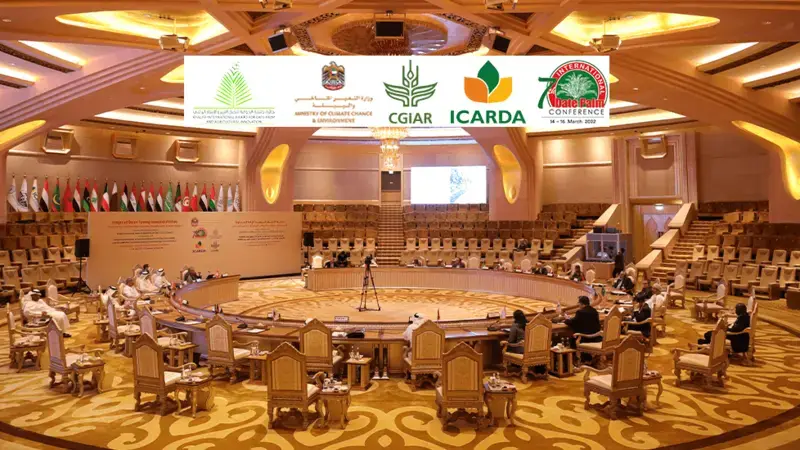
Under the patronage of His Highness Sheikh Khalifa bin Zayed Al Nahyan, President of the United Arab Emirates, Regional Ministers of Agriculture, NARS Representatives, and other experts and key stakeholders gave a thumbs up to the Integrated Desert Farming Innovation Platform presented by Mr Aly Abousabaa, CGIAR Regional Director of CWANA and Director General of ICARDA, at the CGIAR at a KIADPAI / CGIAR side-event on March 14-15 during the 7th International Date Palm Conference in Abu Dhabi.
The side event, opened by Her Excellency Mariam bint Mohammed Saeed Hareb Almheiri, United Arab Emirates' Minister of Climate Change and Environment, and Dr. Abdelouahab Zaid, Secretary-General of KIADPAI, brought together experts and stakeholders from all over the region to discuss collaboration and commitment towards an Integrated Desert Farming Innovation Platform (IDFIP).
It was a unique opportunity to discuss regional and country-specific agri-challenges with Ministers, NARS experts and other key stakeholders all together in the same room and to pinpoint clear objectives and a roadmap for the platform. Priority initiatives aim to strengthen the region's pillar industries, such as date palm production, alongside the deployment of water and energy-saving innovations, especially in protected agriculture (greenhouse farming).
The Integrated Desert Farming Innovation Platform is an initiative long developed by CGIAR and its partners, and CGIAR high-level delegates presented key factors of the platform. Alongside Mr. Abousabaa were Mr. Elwyn Grainger-Jones, CGIAR's Managing Director of Institutional Strategy and Systems, Mr. Andre Zandstra, Global Director, Innovative Finance and Resource Mobilization, CGIAR, Ms. Temina Lalani-Shariff, CGIAR Regional Director South Asia, Dr. Michael Baum, Deputy Director-General of ICARDA, Dr. Abdoul Aziz Niane, Regional Coordinator of ICARDA's Arabian Peninsula Program, and Ms. Mary Margaret McRae, Head of Partnerships and Resource Mobilization, ICARDA.
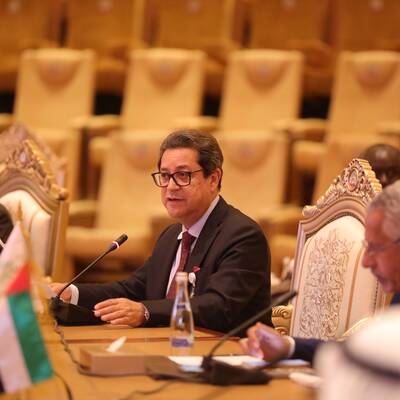
"Innovation can only flourish in partnerships. We ask for your expertise & commitment towards transforming livelihoods in the region."
- Mr Aly Abousabaa, CGIAR Regional Director of Central and West Asia and North Africa, and ICARDA Director-General.
Capitalizing on private sector partnerships and technologies featured high in the discussion as a means to speed up innovation and technology transfer to the farmers themselves. Protecting the region's threatened biodiversity through soil health initiatives and genebanks was also a subject of clear concern given the speed of degradation of the region's genetic resources due to climate change and ill-planned land use. Finally, all sides agreed on strong capacity building with a view to involving regional higher-education institutions and farmer associations to train tomorrow's experts and extension service workers.
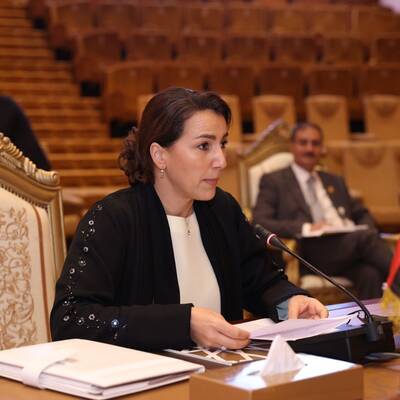
"The Desert Farming Innovation Platform will improve use the of natural resources such as wind and solar power for a food and nutrition secure region. This event is crucial for discussion to expand on these aspects."
- H.E. Mariam bint Mohammed Saeed Hareb Almheiri, Minister of Climate Change and Environment, UAE.
The Integrated Desert Farming Innovation Platform boosts a new phase of international and regional collaboration, sharing knowledge and assets to accelerate agricultural innovations along field-to-fork value chains. The platform builds on established technologies such as improved water management, the development of climate-smart crops, integrated crop/livestock systems, and efforts to reduce desertification while boosting pillar industries such as date palm production. It will also fast-track technology innovation breakthroughs in water and soil productivity and accelerate the adoption of innovative information technology, artificial intelligence, integrated pest management, and digital extension services.
PARTNERSHIPS FOR SUSTAINABLE FOOD SYSTEMS
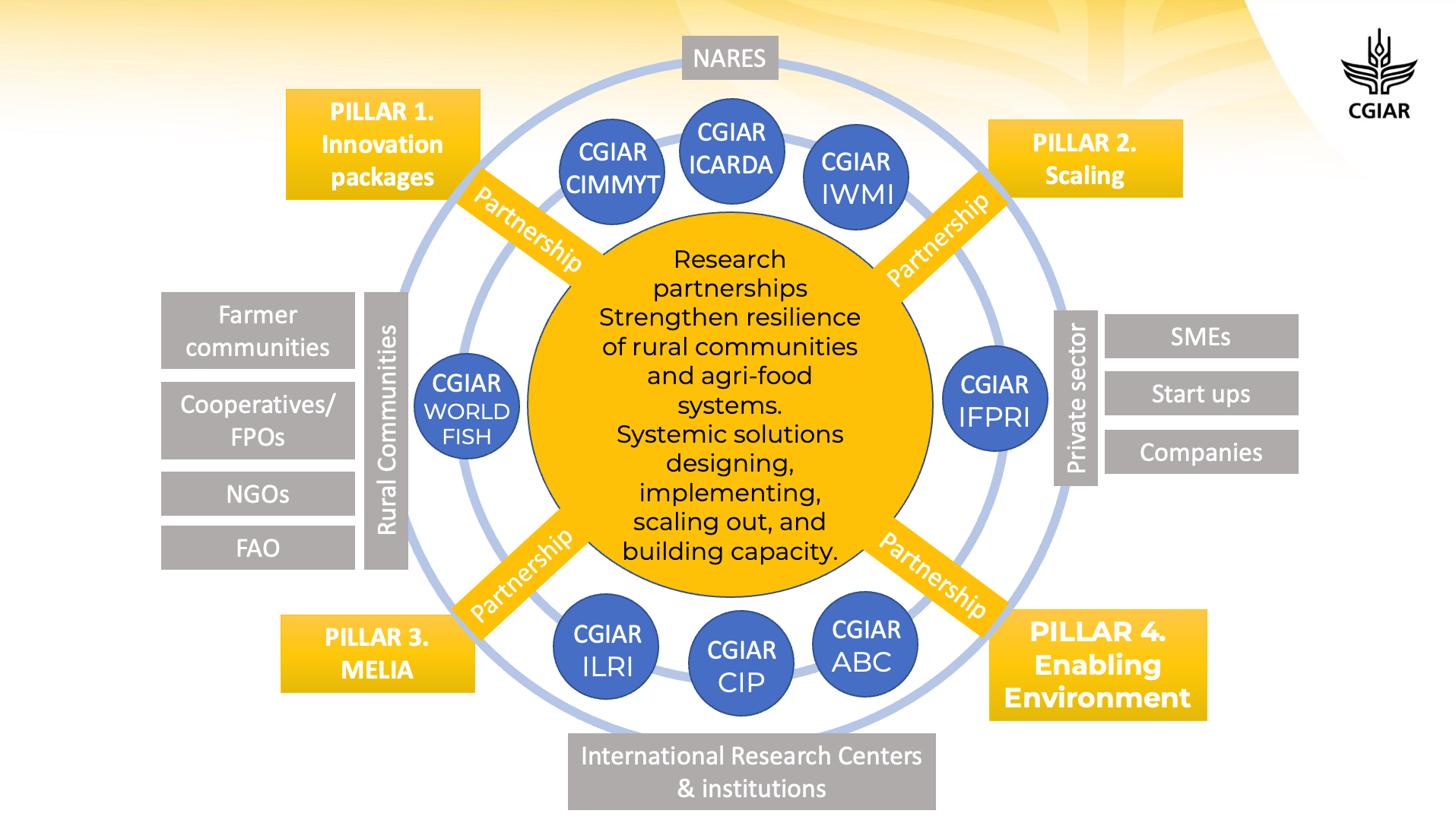
The Gulf Cooperation Council (GCC) funded date palm project managed by ICARDA also acts as a strong framework on which to build the IDFS platform, and the side-event was carried out during the 7th International Date Palm Conference. in the UAE. Every four years, the conference provides opportunities for date-producing and manufacturing countries to share scientific knowledge and experience on various aspects of date palm production, protection, and marketing, and supports international technical cooperation in various fields of the date production chain.
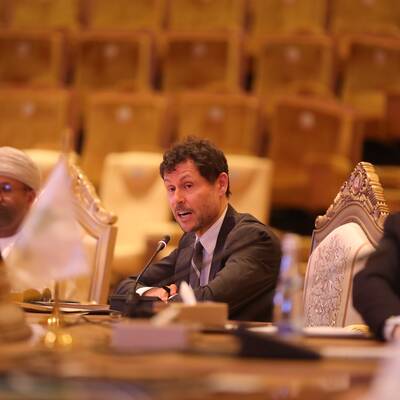
"The Integrated Desert Farming Platform allows CGIAR the opportunity to offer our partners innovation, assets, long-term relationships, trust, & networks, and the expertise of over 3500 global food-systems scientists"
- Mr. Elwyn Grainger-Jones, CGIAR's Managing Director of Institutional Strategy and Systems.
DISCUSSION OUTCOMES
Participants identified several hurdles that could hinder the platform's development if not addressed early on. Firstly, that the speed of climate change may outstrip the innovations is of great concern and a driver of the urgency of the platform development. This was reflected in the strong attendance at the event. Questions also remain surrounding funding mechanisms for the platform and the careful balance of time, effort, and funding needed to convince farmers to swap out-of-date technology and practices for new but unfamiliar climate-smart innovation. Market access and marketing for new products will also need to be developed so that farmers who produce more can actually sell more. Concerns related to lack of accessibility to markets, training, and technology due to language barriers will also need to be considered during the platform's development.
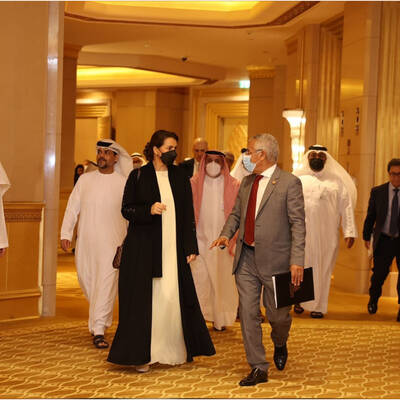
"The newly-launched Integrated Desert Farming Innovation Platform platform is based on solid scientific and technical foundations and will boost the development and adoption of climate-smart crops and enhanced water management systems in this climate-vulnerable region."
- H.E Dr. Abdelouahhab Zaid - Secretary-General of KIADPAI
NEXT STEPS
The assembled participants provided input to the Abu Dhabi Declaration - a framework for an eventual formal commitment to the platform – and advised on four to six months for further platform design, overseen by ICARDA, CGIAR's dryland research center based in MENA. This begins with achieving a fine-grained understanding of regional challenges and country priorities, along with a simultaneous stock-take of available and currently in-research innovations throughout the region. Considerations pertaining to monitoring, governance, management, and capacity building must also be settled upon.
The event proved a solid and encouraging start, and the basic principle of the Integrated Desert Farming Innovation Platform has been met with support from all parties. With COP27 just around the corner, the high-level discussions surrounding the adoption – and ratification – of the Abu Dhabi Declaration are sure to gain momentum in the coming weeks and months.
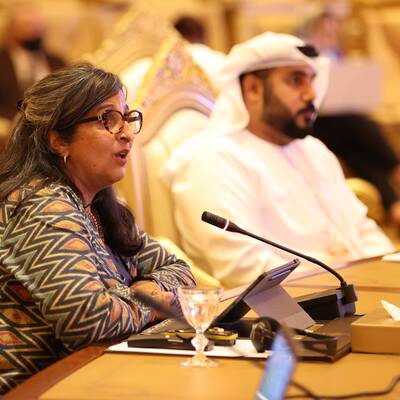
The new CGIAR model is more responsive to your regional needs, to help solve your issues in a timely manner, offer better investor ROI, build capacity and create fresh & bold innovation”
- Temina Lalani-Shariff, CGIAR Regional Director, South Asia
It is a given that dryland farmers, especially those operating in marginal desert ecosystems, will need unified and bold support in fresh technology and innovation if they are to have any hope of sustainable farming activities as climate change intensifies. The Abu Dhabi Declaration - and its associated Integrated Desert Farming Innovation Platform - will help them do just that.
-----------
Attending the KIADPAI/CGIAR Integrated Desert Farming Side Event were Her Excellency Mariam bint Mohammed Saeed Hareb Almheiri, United Arab Emirates' Minister of Climate Change and Environment, Dr. Abdelouahab Zaid, Secretary-General of KIADPAI, Mr. Elwyn Grainger-Jones, CGIAR's Managing Director of Institutional Strategy and Systems, CGIAR CWANA Director and ICARDA Director General Eng. Aly Abousabaa, alongside 11 Agriculture Ministers from WANA, directors of regional and international organizations, and delegations from national and regional agricultural research systems.
Also attending/speaking at the event were:
- Dr. Abdul Aziz Kareem, Undersecretary of Agriculture & Marine Wealth, Bahrain's Ministry of Works, Municipalities Affairs and Urban Planning
- Eng. Hussein Jawad Allaith, Director of Plant Wealth, Bahrain
- Mr. Hussein Al Ibrahim, Director of the Department of Agriculture and Food, General Secretariat of the GCC, KSA
- Mr. Othman El-Jamea, Head of Plant Wealth Department, Agriculture and Food Administration, General Secretariat of the GCC, KSA
- Eng. Mohammed Ahmed Hamdan Al Dhanhani, Director of the Agriculture Development & Health Department at the Ministry of Climate Change and Environment, UAE
- Dr. Amal Abdulkareem Abdullah, Assistant Director of Agriculture Research and Experiments, Plant Resources Sector, Public Authority of Agriculture Affairs & Fish Resources, Kuwait
- Dr. Hamdan Al Wahibi, Director-General of Agricultural & Livestock Research, Ministry of Agriculture Fisheries Wealth and Water Resources, Oman
- Eng. Hamad S. Al-Shamari, Director of Agricultural Research Department, Ministry of Municipality, Qatar
- Dr. Sowaid El-Maliki, Technical Coordinator, Ministry of Municipality, Qatar
- Mr. Olivier Durand, Agricultural Economist, World Bank
- Dr. Bander Mohamed Al Saghan, General Director of the General Directorate of Agricultural Research and Extension, Ministry of Environment & Water and Agriculture, KSA
- Dr. Sidi Ely Menoum, Managing Director, Centre National de Recherche Agronomique et de Development Agricole (CNRADA)
- H.E Prof. Ibrahim Adam El Dukhiri, Director General of the Arab Organization for Agricultural Development (AOAD)
- Mr. Abdul Hakim El Waer, FAO Assistant Director-General and Regional Representative for the Near East and North Africa
- Prof. Rida Shibli, Executive Secretary of the Association of Agricultural Research Institutions in the Near East and North Africa (AARINENA)
- Dr. Majeda Mofleh, Director General of the General Commission of Scientific Agricultural Research (GCSAR), Syria
- Dr. Faouzi Bekkaoui, Director General of INRA, Morocco
- Dr. Hichem Ben Salem, Director General and Interim President of the Institution de la Recherche et de l’Enseignement Superieur Agricoles (IRESA), Tunisia
- Dr. Abdelhamid Bousaloum, Director General of the Agricultural Research Center (ARC), Libya
- Dr. Abdulla Omari, NARC representative, National Center for Agricultural Research (NARC), Palestine
- H.E Dr. Abdulredha Bahman, Senior Agricultural Advisor, Kuwait Fund for Arab Economic Development, Kuwait
- Dr. Hasnah Bin Hussain, Kuwait Fund for Arab Economic Development, Kuwait
- Dr. Abdullah Salem Alwan, Chairman of the Agricultural Research and Extension Authority (AREA), Yemen
- Mr. Andre Zandstra, Global Director, Innovative Finance and Resource Mobilization, CGIAR
- Ms. Temina Lalani-Shariff, Regional Director of South Asia at CGIAR
- Dr. Michael Baum, Deputy Director-General of ICARDA
- Dr. Abdoul Aziz Niane, Regional Coordinator of ICARDA's Arabian Peninsula Program
- Ms. Mary Margaret McRae, Head of Partnerships and Resource Mobilization, ICARDA
